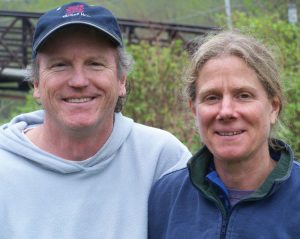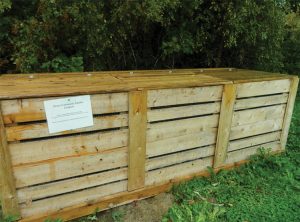Bulletin #4311, Planning and Managing a Community “Giving” Garden in Maine (Sections 24-26)
Putting the Garden to Sleep
I approach putting the garden to sleep with mixed emotions. On one hand, I am usually tired, and I know I have a lot of other work coming. I most often welcome putting the garden to bed. On the other hand, I know that with October ending, winter is not far behind.
As mentioned before, we try to cover-crop beds that we cannot replant with vegetables and get harvested for delivery. This is also an excellent time to soil sample your garden. I sample areas that are similar. I generally turn in three samples total from among the 53 beds we produce. Since there are likely differences in the soils across the garden, try to sample from similar areas with each soil sample you collect. Sampling in the fall gives you plenty of time to plan what to do next year. (For more information, see Bulletin #2286, Know Your Soil: Testing Your Soil.) Update your plot map to make sure it reflects accurately what you planted when and where. Pull out any row covers and supports in the beds, and if you have used weights in the field to hold down the row covers, bring those back in. It is a good time to assess the condition of your compost bins. We have a three-bin compost system.
The idea behind this compost system is that you place fresh plant material in the left-most bin. When it has broken down, you move it to the middle bin. After time in the middle bin, you move the almost completely broken-down material to the final bin. There is often too much biomass in the harvesting process to fit into the first bin and we find a place to stack that material that is out of the way. You can take the compost from the third bin and put it onto recently harvested beds, move the material from the middle to the third and the first to the second bin, and refill the first bin with any excess vegetation growing in the garden or the stack nearby.
This is a good time to assess the status of your tools and recycle materials that are no longer useful to you. Some say that cleanliness of tools is a mirror of the cleanliness of the person using the tool. I would like to say that I clean and sharpen all my tools, organize my shed, and tidy everything up before the last garden day or just after it, but I usually consider doing this, and that is as far as it gets. But having sharp tools is a great way to start the season. (See Getting Your Garden Tools Ready for the Season for more info.)
We also go back and ask for our reusable bags from food recipients. I discard the ones that look tired, and I wash the ones that are healthy but dirty.
Overwinter Storage
The last thing to remember to do is to remove seed from tool storage areas. Anything that can attract rats will attract rats. Rats love vegetable seeds. Some leftover seed can be used the next year. All seed loses germination capacity over time. But, some seed varieties are worse than others. Much brassica seed can be used in year 2. Most beans, spinach, beets, and chard should not be replanted in year 2. The best plan is to buy fresh seed. Gardening is hard enough that you don’t want to waste your time planting a bed that won’t germinate.
Conclusions

Doing the Orono Community Garden project has been the most satisfying program I have been a part of in Extension. The connections made with our recipients, teaching others to garden, working with beautiful caring people, watching some students who have helped go on to farm, and being outside in nature have been incredibly satisfying. I want to thank all the volunteers who have ever been a part of this program. I want to thank the Church of Universal Fellowship and the Orono Health Association for financial support. Mostly I thank my beautiful wife for her tireless help over 15 years.
I hope you will try to make a community giving garden happen in your town.
Remember that the University of Maine Cooperative Extension and many other land-grant universities offer extensive online Extension resources that can help people address their garden issues. Learning to grow food is a life skill that no one can take away from you. Good luck, and garden well.
The University of Maine System (the System) is an equal opportunity institution committed to fostering a nondiscriminatory environment and complying with all applicable nondiscrimination laws. Consistent with State and Federal law, the System does not discriminate on the basis of race, color, religion, sex, sexual orientation, transgender status, gender, gender identity or expression, ethnicity, national origin, citizenship status, familial status, ancestry, age, disability (physical or mental), genetic information, pregnancy, or veteran or military status in any aspect of its education, programs and activities, and employment. The System provides reasonable accommodations to qualified individuals with disabilities upon request. If you believe you have experienced discrimination or harassment, you are encouraged to contact the System Office of Equal Opportunity and Title IX Services at 5713 Chadbourne Hall, Room 412, Orono, ME 04469-5713, by calling 207.581.1226, or via TTY at 711 (Maine Relay System). For more information about Title IX or to file a complaint, please contact the UMS Title IX Coordinator at www.maine.edu/title-ix/.


